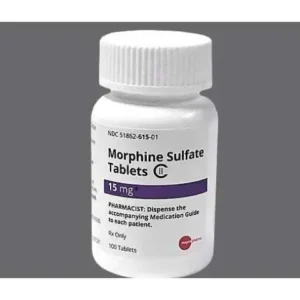Morphine is a powerful opioid medication used to relieve severe pain. Morphine is available in various forms, including tablets, capsules, injections, and oral solutions, with different dosages to suit the needs of the patient.
The appropriate dosage of morphine depends on the individual’s pain level, their tolerance to opioids, and the prescribing healthcare provider’s recommendations. It’s important to take morphine exactly as prescribed by a healthcare professional because it can be habit-forming and has the potential for misuse or addiction.
Some key points about morphine include:
- Pain Relief: Morphine is typically prescribed for the management of severe pain, such as pain from surgery, injury, cancer, or other conditions causing significant discomfort.
- Opioid Medication: Morphine is an opioid, which means it works by binding to opioid receptors in the brain and central nervous system to reduce the perception of pain.
- Side Effects: Common side effects of morphine may include drowsiness, constipation, nausea, vomiting, and changes in mood. It can also cause respiratory depression (slowed breathing), which is a significant concern if the medication is misused.
- Tolerance and Dependency: Prolonged use of morphine can lead to the development of tolerance, which means that over time, higher doses may be required to achieve the same level of pain relief. It can also lead to physical dependence, and discontinuing the medication should be done under medical supervision to prevent withdrawal symptoms.
- Safety Precautions: Morphine should be stored securely to prevent unauthorized use. It should only be taken as prescribed, and it’s important to avoid alcohol and certain other medications that can interact with morphine and potentially cause adverse effects.
- Consultation with a Healthcare Provider: If you have been prescribed morphine, it is essential to have a conversation with your healthcare provider to understand the proper dosage, potential side effects, and the duration of treatment. If you experience any concerns or side effects, it is important to communicate with your healthcare provider promptly.
Morphine is a potent medication and should be used under the guidance of a healthcare professional. It is important to take it as prescribed and to be aware of the potential for tolerance, dependency, and side effects associated with opioid medications like morphine. If you have specific questions or concerns about your morphine prescription, it’s advisable to discuss them with your prescribing healthcare provider.




Reviews
There are no reviews yet.